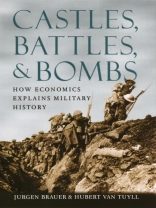Castles, Battles, and Bombs reconsiders key episodes of military history from the point of view of economics with dramatically insightful results. For example, when looked at as a question of sheer cost, the building of castles in the High Middle Ages seems almost inevitable: though stunningly expensive, a strong castle was far cheaper to maintain than a standing army. The authors also reexamine the strategic bombing of Germany in World War II and provide new insights into France s decision to develop nuclear weapons. Drawing on these examples and more, Brauer and Van Tuyll suggest lessons for today s military, from counterterrorist strategy and military manpower planning to the use of private military companies in Afghanistan and Iraq. "In bringing economics into assessments of military history, [the authors] also bring illumination. . . . [The authors] turn their interdisciplinary lens on the mercenary arrangements of Renaissance Italy; the wars of Marlborough, Frederick the Great, and Napoleon; Grant’s campaigns in the Civil War; and the strategic bombings of World War II. The results are invariably stimulating." Martin Walker, Wilson Quarterly "This study is serious, creative, important. As an economist I am happy to see economics so professionally applied to illuminate major decisions in the history of warfare." Thomas C. Schelling, Winner of the 2005 Nobel Prize in Economics
Jurgen Brauer & Hubert van Tuyll
Castles, Battles, and Bombs [EPUB ebook]
How Economics Explains Military History
Castles, Battles, and Bombs [EPUB ebook]
How Economics Explains Military History
Koop dit e-boek en ontvang er nog 1 GRATIS!
Taal Engels ● Formaat EPUB ● ISBN 9780226071657 ● Uitgeverij University of Chicago Press ● Gepubliceerd 2008 ● Downloadbare 3 keer ● Valuta EUR ● ID 5658702 ● Kopieerbeveiliging Adobe DRM
Vereist een DRM-compatibele e-boeklezer












